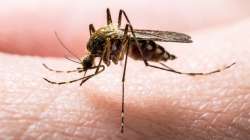Global warming may limit spread of dengue fever: Study
Future climate models point to increasing frequencies of extreme temperature events, making short exposures to high temperatures a threat to the survival of dengue and Wolbachia infected mosquitoes

Global warming could limit the spread of dengue fever but could also affect Wolbachia as a biological control agent, according to new research.
Researchers, at the Pennsylvania State University in the US, found that infection with the bacterium Wolbachia, which has recently been used to control viral infections in mosquitoes, also increases the thermal sensitivity of the insects. Wolbachia have been shown to prevent viruses, including dengue, from replicating inside mosquitoes.
But future climate models point to increasing frequencies of extreme temperature events, making short exposures to high temperatures a threat to the survival of dengue and Wolbachia infected mosquitoes, the researchers said.
Also Read: 40 cases of dengue in Delhi this year so far
At lower temperatures, we know that dengue virus may fail to replicate fast enough to make it through the mosquito body and be transmitted, thereby reducing transmission risk," said Fallon Ware-Gilmore, a graduate student in the Department of Entomology at Penn State.
"At higher temperatures, while the virus may replicate faster, our work suggests that a corresponding reduction in mosquito thermal tolerance may act as a counterforce on mosquito survival that could help to reduce transmission and potentially human disease incidence in hotter, more climate-variable regions. Similarly, our work suggests that Wolbachia may fail to work as a biocontrol agent in hotter regions given its effect on mosquito survival," she added.
For the study, published in the journal PLOS Neglected Tropical Diseases, the team placed infected mosquitoes in sealed vials and then submerged the vials into a water bath heated to 42 degrees Celsius -- a realistic temperature extreme that a mosquito might encounter in the wild.
The researchers then measured how long it took for the mosquitoes to become immobilized and compared the time to uninfected control mosquitoes.
The team found that mosquitoes infected with the dengue virus showed greater sensitivity to heat; they became immobilized almost three times faster than uninfected mosquitoes when placed in the hot water bath. Similarly, mosquitoes infected with Wolbachia became immobilized four times faster than uninfected mosquitoes.
Interestingly, dengue virus and Wolbachia bacteria did not have an additive effect on mosquito thermal tolerance.
Also Read: Why Delta Covid variant is spreading rapidly?